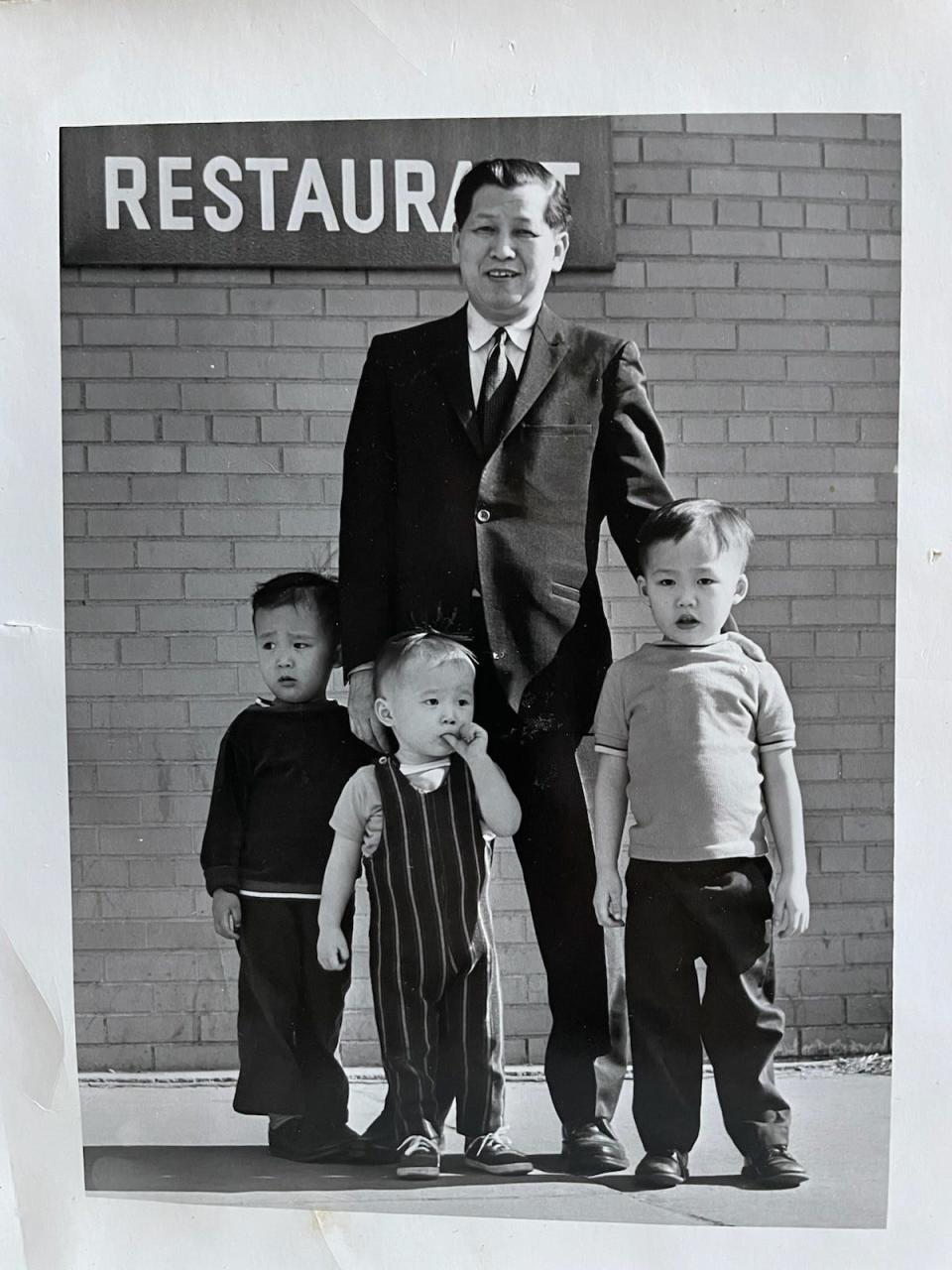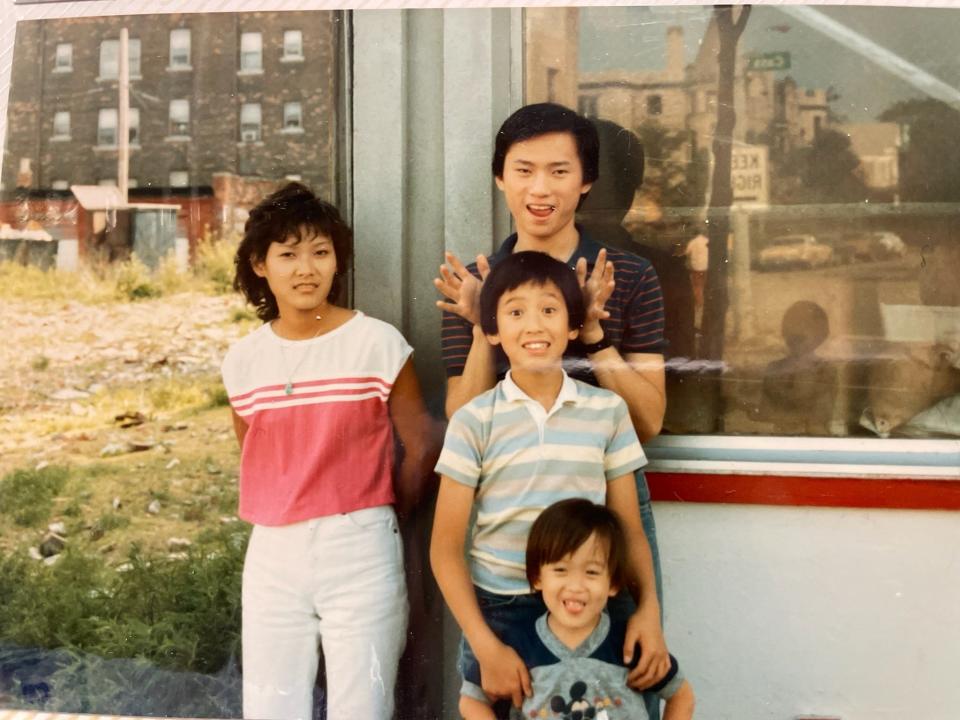Opinion: I grew up in Detroit's Chinatown. Demolition gives me one less reason to return.
Growing up in my family’s Chinese restaurant on the corner of Cass and Peterboro, we were always working. We rarely took pictures, and most of my childhood memories are preserved in my mind and the few buildings that remain in the city’s former Chinatown. That’s why I was so devastated when I heard that the city had ordered the demolition of the On Leong Hall, a historic building that once housed Chinatown’s community center.

My feelings of hopelessness and anger contrasted with the optimism I had felt just a few months earlier when one of the other Chinatown buildings, the one that had housed our restaurant, had just been sold. The new owners reached out to me in Los Angeles: “How would you like to re-open your family’s restaurant?”
Though I had been a professional writer for most of my adult life, I genuinely considered the intriguing proposition. Wouldn’t it be fun to bring back a part of my childhood?
For six decades, my family ran Chung’s Cantonese Cuisine, one of the most popular Chinese restaurants in the Motor City. We were famous for our homemade egg rolls and almond boneless chicken. Originally located in the city’s Old Chinatown (around Michigan and First, near Corktown), my grandparents relocated the business to the Cass Corridor in the 1960s after the city demolished the neighborhood to make way for the Lodge Freeway.
This was where I grew up.
Chung’s, and by extension, the city’s New Chinatown, was a great place to grow up in the 70s and 80s. Yes, there were lots of challenges (e.g., crime and crack), but there was a vibrant, tight-knit community of Asian American residents and businesses working hard to build a future for me, my siblings and other kids.

Built in 1883, and purchased by a Chinese American community organization in the 1960s, the community center was an icon.
It's a big part of my memories, though my first recollection was not necessarily a happy one. I’m a toddler, crying in my mom’s arms, waiting in the hallway for my flu shot. But things improved after that. As I got older, and my parents became more insistent that we stay off the increasingly dangerous streets, my siblings and I would sometimes run around the center, exploring every room: the giant conference hall with fancy mahogany chairs, the commercial-grade kitchen preparing for the next banquet, the costume closet that stored all the gear for the lion dance.
More: Whitmer signs $57.4B state budget, the first crafted by Michigan Democrats in 40 years
More: Asian Americans mourn loss of Chinatown building, ask Ilitches to work with community
On Tuesday nights, the entire community would gather on the top floor, where the center hosted Hong Kong movie nights — it was the only way to see Asian action stars before the Internet and VHS tapes. We even had the occasional Miss Chinatown beauty pageant, and big parties like my grandparent’s 50th wedding anniversary.
As the city’s misfortunes continued to slide into the 1990s, it became untenable to maintain our family business, and in 2000, we had to close the location. By then, all the other restaurants had closed, and the community center had shut its doors.

Like many Detroiters, I eventually moved out of the state in search of better economic opportunities, moving first to New York before ending up on the West Coast. I would fly back once or twice a year to see my extended family. My great grandpa, who arrived in the area a century earlier, had 10 kids, so there was plenty of family to see.
Like so many Detroiters who no longer live in Michigan, we remain fiercely loyal to our hometown. We proudly wear our Tigers and Red Wings gear and defend Motown whenever anyone so much as makes a quip about the "murder city." We constantly look for ways to reconnect with our hometown, for a reason to come back to the 313.
So, when the new owners called this spring to explore Chung’s revival, a flood of memories came to me: playing mahjong with my siblings and cousins, the holidays we celebrated, and, of course, all the delicious food we ate. For a brief moment, I thought of saying yes, but then I pulled myself together and came back to reality. I have my first book coming out later this year — a memoir about growing up in Detroit’s Chinatown — so the timing wouldn’t work. Though I passed on the opportunity, in my mind, I left the door open to having this conversation again when I got even older.
Any fantasies of returning to Detroit took a huge hit when the city greenlit the demolition of our old community center.
A friend from Chicago, a former Michigander who happened to be in Detroit and visiting the former Chinatown, sent me images from the demolition site. Despite last-minute efforts to save the building, it was now a pile of rubble. Its demise continued a long but predictable cycle of communities of color being demolished in the city.
As I pondered the remains of the On Leong structure, I was reminded why I couldn’t go home to Detroit, not even when asked. What’s the point? More and more, the Detroit of my childhood exists only in my mind.
Don’t get me wrong. I’m happy there’s new capital coming in, and that middle-class white people are embracing the city. I’ve even wrapped my head around the Cass Corridor being rebranded Midtown. (Though it will always be the Corridor to me.)
I want to be part of the city’s renaissance, but every time I go home, there are fewer places where I feel connected. With the destruction of the venerable building, there was now one less reason to come home. At some point, there won’t be any reasons left, not even the promise of a good homecooked meal.
Curtis Chin was born and raised in Detroit. Now living in Los Angeles, he has written for network and cable TV, as well as CNN, Bon Appetit and the Boston Globe. His memoir, "Everything I Learned, I Learned in a Chinese Restaurant"" will be published by Little, Brown on Oct. 17. For more information and a schedule of his tour, please go to curtisfromdetroit.com.
This article originally appeared on Detroit Free Press: Opinion: Detroit Chinatown demolition is destruction of history

